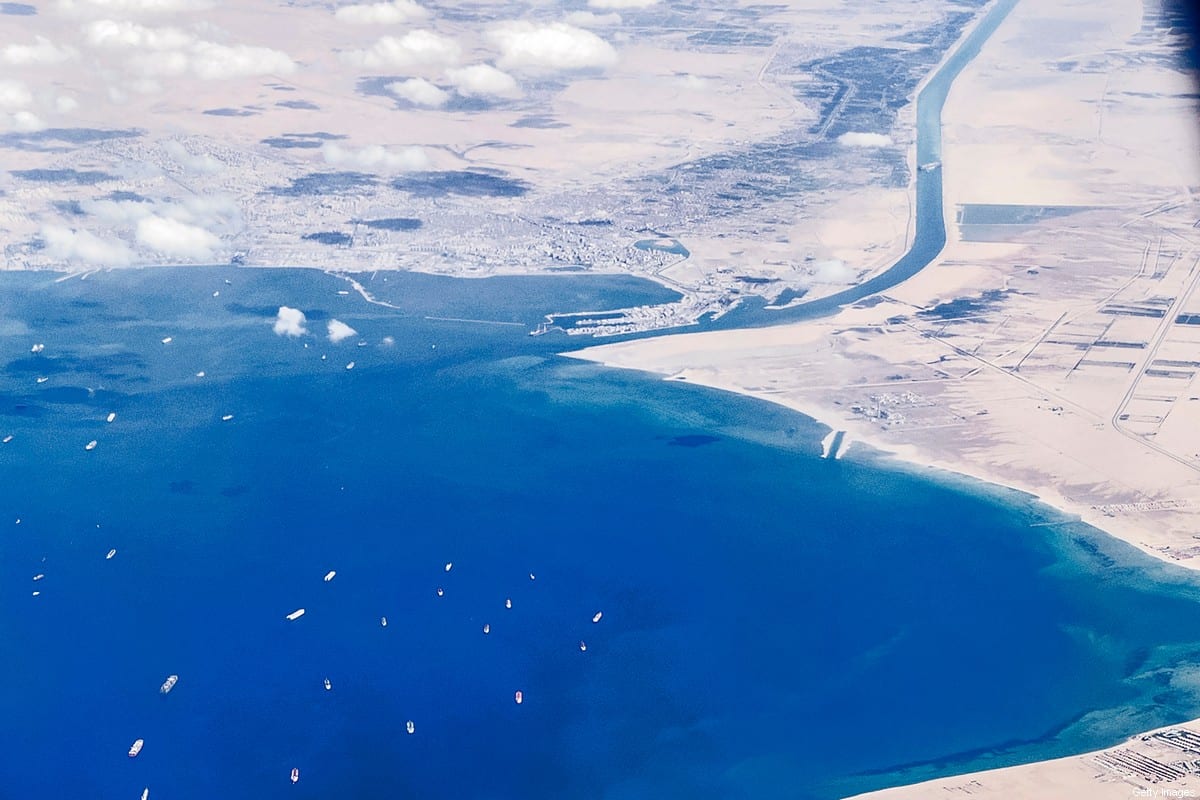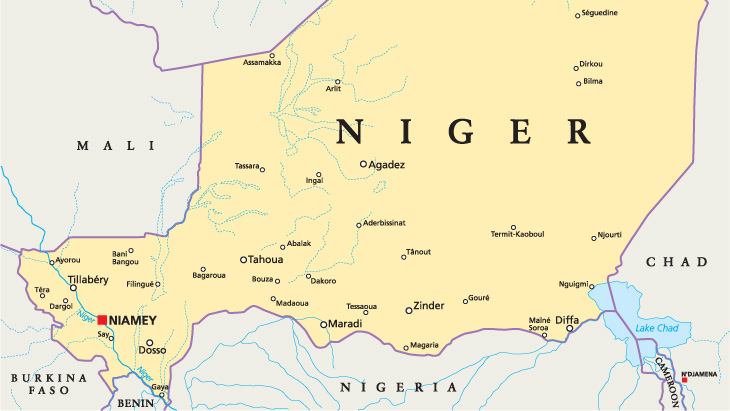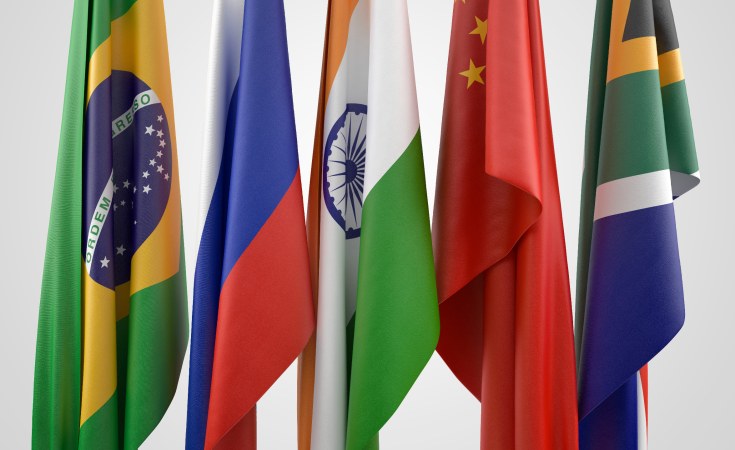By Priyal Singh: Will an expanded BRICS precipitate a new international order, or collapse under the weight of its internal contradictions? The words of 13th century Persian poet Jalāl al-Dīn Muḥammad Rūmī, 'As you start to walk the way, the way appears,' certainly found new resonance in Johannesburg last week at the 15th BRICS Summit. Apart from expanding the diplomatic club to include Iran, Argentina, Egypt, Ethiopia, Saudi Arabia and the United Arab Emirates, the summit revealed the global south's growing disillusionment with the current structure of the international system. These frustrations have bolstered BRICS' appeal as a counterweight to leading Western countries, such as those composing the G7. More significantly, an expanded BRICS represents a resounding call for international reform by global south states, exclusive from, and in opposition to, traditional Western powers. This unprecedented moment reflects the shifting locus of global power, and has propelled an expanded BRICS to chart a way into unknown territory. Decisions over the nature and trajectory of global order were once the sole preserve of the European 'great' powers, along with the United States (US). The contemporary international system will undoubtedly be shaped by the Asia-Pacific region, Africa, the Middle East and Latin America. If global institutions fail to evolve, international cooperation on pressing issues will inevitably fail If global institutions fail to evolve and accommodate this reality, international cooperation on the most pressing issues of our time will inevitably fail. On paper, this is the fundamental challenge BRICS intends to address in order to bring about a more 'representative, fairer international order, [and] a reformed multilateral system.' How it does so, however, remains poorly defined. One likely approach is to use the group's combined economic clout to pursue global governance, financial and justice system reform, and alternative paths on specific issues like climate change. Already, the current BRICS states' collective economic output (based on GDP adjusted for purchasing power parity) is roughly US$3 trillion larger than the G7, which includes Canada, France, Germany, Italy, Japan, the US and United Kingdom. (As a non-enumerated member, the European Union is excluded.) With six new BRICS members in 2024, this difference rises to just under US$11 trillion. However, economic output measured by GDP based on current exchange rates places the G7 as the larger combined economy (even with the six new BRICS members). Coordinated action on points of contention may not be as easy for BRICS as for the G7 Regardless, countries in the global south are increasingly poised to challenge the economic dominance of traditional powers. And based on the former's current growth trajectories, will decisively outperform the G7 economies over the coming decades. This combined economic influence could help to secure greater representation and fairer rules and procedures in the United Nations Security Council, International Criminal Court, World Bank and International Monetary Fund - among others alluded to in the BRICS Johannesburg II Declaration. However, coordinating common action on specific points of contention may not be as easy for the expanded BRICS grouping as for the G7. G7 countries have structured their cooperation on global matters around shared liberal political values and norms, particularly on democracy and civil liberties. While these have been threatened in recent years by the rise of populist right-wing administrations, G7 members' considerable normative and political alignment underpins their global economic clout. The expanded BRICS grouping, on the other hand, is a more arbitrary constellation of states with very different (and sometimes diametrically opposed) political systems and values. They range from progressive constitutional democracies to closed and repressive theocracies, to countries experimenting with hybrid authoritarianism. Ironically, BRICS may be in its ascendency due to its ambiguity and loosely articulated vision: An analysis of various governance variables across member countries, including perceptions of political stability, rule of law, government effectiveness and basic freedoms, reveals a high level of variance. Scores for each of these variables show a standard deviation from the mean that is often more than double that of G7 countries. That raises serious questions about BRICS' ability to pursue coherent, coordinated action on global institutional reform, despite members agreeing that the international system is unfairly structured. Without a robust normative basis for cooperation, disagreements over issues such as gender equality, individual rights and liberties, and the character of a new international order, could derail momentum needed for meaningful change. Ironically, BRICS may well be in its ascendency due to its ambiguity and loosely articulated vision of multipolarity and a reformed international system. However, as the group expands and evolves into something more concrete, difficult issues may not be as easy to kick down the road as before. For example, how do all members justify provisions in the Johannesburg II Declaration on respecting international humanitarian law in conflict situations, increased participation of women in peace processes, and the promotion and protection of democracy, human rights and fundamental freedoms for all? Squaring these provisions with the brazen violations by certain current and incoming BRICS members will test the mettle of the diplomatic club. These contradictions must be overcome for BRICS to muster not only its economic clout, but the moral and political capital to pursue reforms and serve as a counterweight to the G7. Rumi's wisdom still rings true, but as the expanded BRICS group marches towards a new world order, the way ahead may be murkier than initially expected.Priyal Singh, Senior Researcher, Africa in the World, ISS Pretoria. Source: https://allafrica.com/
Brics+ and the Tricky Business of Balancing Global Geopolitics
Egypt announces new oil discovery in Gulf of Suez, amid rising energy demands

An aerial view taken on March 27, 2021 from the porthole of a commercial plane shows stranded ships waiting in queue in the Gulf of Suez to cross the Suez Canal at its southern entrance near the Red Sea port city of Suez [MAHMOUD KHALED/AFP via Getty Images]
Egypt has made a new oil discovery in the Gulf of Suez region, giving it more energy reserves and drilling opportunities amid rising domestic and foreign demand. According to Egypt’s Petroleum Ministry today, the company, Cheiron, made the new oil discovery in the Geisum and Tawila West Concession in the Gulf of Suez through exploration well GNN-11. It is the fourth well to be completed in the area, with another three wells set to be drilled in order to continue the current exploration phase. The GNN field reportedly holds significant promise, with its total output reaching around 23,000 barrels per day, in comparison to the 4,000 barrels per day prior to the development of the field. Cheiron currently holds a 60 per cent working interest in the concession, with the Kuwait Foreign Petroleum Exploration Company (Kufpec) holding the remaining 40 per cent stake. According to Cheiron, the “new Nubia discovery confirms the exploration potential in the northern area of the concession”. It added that “the discovery also demonstrates that while the Gulf of Suez is a relatively mature hydrocarbon province, it still has significant remaining exploration potential.” The discovery comes at a time when Egypt has been seeking to boost its energy production and reserves, particularly the production of natural gas in order to meet the rising energy demands from the domestic front and for exports to Europe.Last year, the value of Egypt’s natural gas exports reached $8.4 billion, an increase of 171 per cent from the previous year. In December last year, Egypt also discovered a large gas field off its north-eastern Mediterranean coastline, possessing potential reserves of 3.5 trillion cubic feet of gas. Source: https://www.middleeastmonitor.com/
A guide: Uranium in Niger : Uranium & Fuel

Current events in Niger mean world attention is turning to the West African uranium-producing country. Here is an overview of Niger's uranium sector. What has happened in Niger? After reports on 26 July that presidential guards had seized Niger's president, Mohamed Bazoum, General Abdourahmane Tchiani - also known as Omar Tchiani - went on national TV on 28 July and declared himself the new leader of Niger. Bazoum became president following a runoff election in February 2021 in which he won 55.67% of the vote. How much uranium does Niger produce? Niger produced 2020 tU in 2022, just over 4% of world uranium output. Current production is from the open-pit operations of SOMAÏR (Société des Mines de l’Aïr), near the town of Arlit. SOMAÏR is 63.4% owned by French company Orano and 36.66% owned by Sopamin (Société du Patrimoine des Mines du Niger). Sopamin manages Niger's state participation in mining ventures. According to data from the World Bank, uranium is Niger's second largest export, in monetary terms, after gold. What is Niger's uranium history? Uranium was first discovered at Azelik in Niger in 1957, and commercial uranium production began at Arlit - 900 km northeast of the capital Niamey - in 1971. COMINAK (Compagnie Minière d’Akouta) - also majority-owned by Orano - began production from an underground mine at Akouta in 1978, producing more than 75,000 tU before operations came to an end in 2021. The Societe des Mines d'Azelik SA (SOMINA) joint venture was set up in 2007 to mine at Azelik/Teguidda, 160km southwest of Arlit, in the Agadez region. 62% of SOMINA's equity is held by Chinese interests, with 37.2% by CNNC International. The government of Niger owns 33%, and 5% is owned by Korean interests. Azelik came into production at the end of 2010 but market conditions led to its being put on care and maintenance in 2015. China National Uranium Corporation has recently been carrying out studies towards the restart of production at SOMINA, according to social media posts by Niger's Minister of Mines Ousseini Hadizatou Yacouba in June this year. What other plans are in the pipeline? The Imouraren project is about 80km south of Arlit and about 160km north of Agadez. Operating company Imouraren SA - owned 66.65% by Orano Expansion (itself owned by Orano Mining with Korean companies holding 4.7%) and 33.35% by Sopamin and the State of Niger - was awarded an operating permit to mine the deposit in 2009 and excavations began in 2012, but development of the project was suspended in 2015 pending more favourable market conditions. The joint venture is now looking into the possibility of using in-situ leach methods to bring it into production. Dasa is a high-grade uranium deposit 105km south of the established uranium mining town of Arlit. First discovered in 2010, the project is 90%-owned by Toronto-listed Global Atomic Corporation and will operate under the company's Niger mining subsidiary SOMIDA (Société Minière de Dasa SA) which is 20%-owned by the government of Niger. Mine excavation began in 2022, with first deliveries to utilities expected to begin in 2025. Canada-based GoviEx Uranium holds mining permits for the Madaouela project, in the Agadez region. The company earlier this year had begun the project financing process to develop the project. GoviEx holds an 80% interest in the operating company COMIMA, with the remaining 20% held by the Republic of Niger. Who buys Niger's uranium? Niger supplies around 5% of the world's uranium, but is a leading supplier of uranium to the European Union. According to the Euratom Supply Agency, EU utilities purchased 2905 tU of Niger-produced uranium in 2021. This represented just over 24% of EU uranium imports, putting Niger slightly ahead of Kazakhstan as the EU's leading source of uranium. What they are saying "Regarding foreign nationals, Orano is in constant discussion with the French authorities. The group closely follows the instructions given by the French Embassy to give the opportunity to employees to leave Niger if they wish so. The group supports its Nigerien teams and thanks them for their professionalism. Activities at the operational sites in Arlit and Akokan as well as at the headquarters in Niamey are continuing." Orano, 1 August "While the situation in Niger remains volatile and there has been protesting in some parts of the capital, the rest of the country remains calm. Importantly, our people remain safe and normal business is being conducted at our offices and development of the Dasa Project continues. The neighbouring African countries union, ECOWAS, as well as the EU and USA have voiced their opinions to the Niger Junta currently running the Country and given a directive that the President and his Ministers be returned to power in 7 days. It is too early to speculate on the outcome of this mandate." Global Atomic CEO & President Stephen Roman, 31 July "GoviEx's operations in Niger continue as usual. Our employees are safe and continue to work diligently on our Madaouela uranium project, ensuring that our activities at both the Project site and our office in the capital city of Niamey proceed without interruption. We are currently able to meet all of our obligations to employees and suppliers, and we anticipate this stability to persist." GoviEx, 31 July "An attempt to overthrow the Nigerien government was announced in the press on July 26, 2023 and the situation remains unstable as at the reporting date of the financial statements. The group has set up a crisis unit to prioritise the safety of its employees. At the reporting date of the financial statements, Orano does not consider this event to have any immediate impact on its activities in Niger or on the value of its assets." Orano half-year results statement, 28 July "Following the recent resignation of the President in Niger, the Company's Dasa Project remains unaffected other than the borders and airport have been temporarily closed which will interrupt our supply lines in the short term … With an infrastructure that has supported uranium mining for over 50 years, an experienced mining work force and the highest-grade uranium deposit in Africa, Global Atomic remains committed to the development of the Dasa Project and the ensuing benefits to our shareholders and the people of Niger." Global Atomic, 27 July "GoviEx's operations in Niger remain unaffected by the current situation. We are committed to ensuring that our activities continue as normal, both at our Project site and our office in Niamey. GoviEx has always worked for the benefit of all stakeholders, including the people of Niger. We believe in the potential of the country and its people, and we remain dedicated to contributing positively to its socio-economic development. Niger has been a pro-mining country and despite changes in regime, has never experienced an interruption in its uranium mining activities over the last 50 years. This long-standing stability in the mining sector is a testament to the country's resilience and its commitment to development." GoviEx, 27 July "Informed of an attempt by certain members of the military to undermine the stability of democratic and republican institutions in Niger, which is tantamount to an attempted coup d'état, the Chairperson of the African Union Commission, HE Moussa Faki Mahamat, strongly condemns such actions by members of the military acting in total betrayal of their republican duty. He urges them to immediately cease these unacceptable actions." African Union, 26 JulyResearched and written by World Nuclear News Source: World Nuclear News

